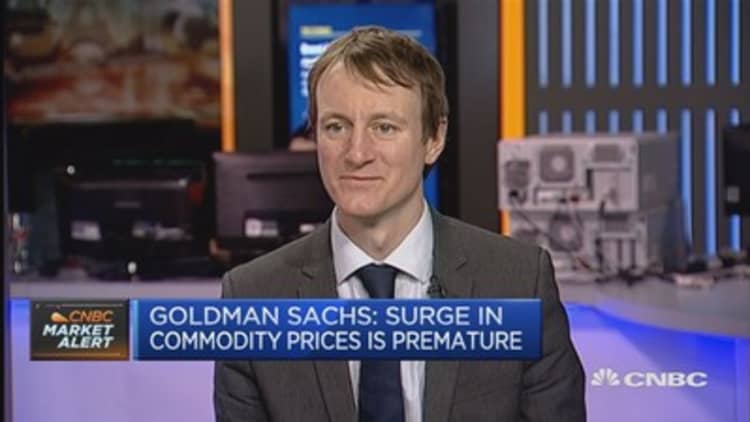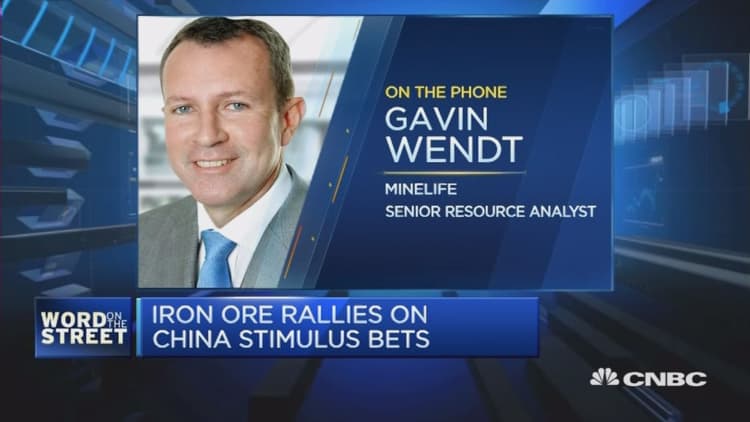



Gold, iron ore and oil prices are seeing a rebound at the moment with many analysts believing that commodity prices have "bottomed out" and are eyeing gains, but Goldman Sachs has issued a warning on the current surge in commodities arguing that it is "not sustainable."
Goldman's commodity analysts noted that while last year commodity prices were driven lower by deflation, divergence and deleveraging, current market views on "reflation, realignment and re-levering have driven a premature surge in commodity prices that we believe is not sustainable."
Goldman's analysis, which was led by Jeffrey Currie, said that while the deflationary dynamics from an excess in commodity supply and slump in demand likely ran their course last year, resulting in signs of rebalancing. "The force of their reversal has created a new trend in market positioning that could run further."
"However, the longer they run, the more destabilizing they become to the nascent rebalancing they are trying to price," the analysts said before explaining why they thought the current dynamics were unsustainable with a particular focus on the oil price rally seen this week.
On Monday, oil prices surged to a three-month high with benchmark Brent crude breaking through the $40 mark, as improving sentiment in financial markets helped support prices and data revealed investors have dramatically upped their bets on the price of oil rising.
Don’t get excited about oil
Goldman warned against getting too excited about a long-awaited oil price rally, however, noting that prices needed to stay lower for some time yet to allow a rebalancing in supply and demand in oil production (which has largely remained high despite demand failing to keep up) to occur.
"Energy needs lower prices to maintain financial stress to finish the rebalancing process; otherwise, an oil price rally will prove self-defeating as it did last spring," Goldman noted.
"While we still believe oil will likely rebalance this year and create a deficit market by year end, 'green shoots' of a deficit alone are not sufficient for a new sustainable bull market."
"Only a real physical deficit can create a sustainable rally which is still months away should the behavioral shifts created by the low prices in January and February remain in place… This is why an early rally in oil prices would prove self-defeating before a real deficit materializes as it would reverse the supply curtailments that are expected to rebalance the market in the second half of 2015," they added.
Bearish factors and false starts
Metals have also seen price rises of late with iron ore, zinc, copper and aluminum prices all witnessing price rises this year.
On Monday, spot prices for iron ore prices rose over 18 percent to over $60 a ton amid expectations that China was planning to boost steel production, of which iron is a key ingredient. Meanwhile, gold prices rose near to a 13-month high on Tuesday at $1,270.76 an ounce, supported by hopes that the U.S. Federal Reserve would not raise interest rates later this week.
Goldman was again bearish, however, saying that structural factors limiting commodity prices were still in play. The iron ore rally, it said, would "likely prove temporary" and it maintained its end-of-year target of $35 a ton. Goldman's near-term target for gold was $1100/oz as it forecast stronger U.S. growth than forecast by markets.
"Despite a continued deterioration in Chinese manufacturing data in the face of recent easing measures, copper and metal prices have also surged to fresh highs. Again we believe these rallies are also not supported by the broader financial environment in China." China is credit constrained, Goldman said, and likely to use limited stimulus to promote consumption over investment through fiscal policy.
Lastly, Goldman warned that "it is important to remember that in the end this was a supply-driven bear market and will not trade like a demand-driven market…In the current supply-driven market, demand hasn't really changed, it takes lower prices to push and keep supply below demand to create a deficit."
"As a result, higher prices are much harder to sustain in a supply-driven market since supply is primed to return with higher prices. But this lesson will likely only be learned through false starts."


